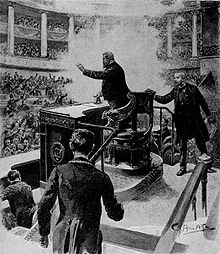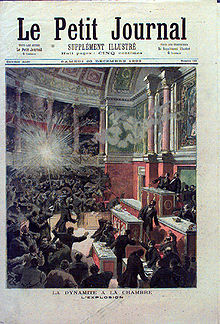Auguste Vaillant
Auguste Vaillant (* 1861 in Mézières , Département Ardennes , † February 5, 1894 in Paris ) was a French anarchist and assassin . After his attack on the French National Assembly , the lois scélérates - a series of emergency laws - were passed.
Life
Vaillant's life before the attack
Auguste Vaillant had a difficult childhood. From the age of twelve he lived alone in Paris and had to deal with the police several times over minor offenses. As an apprentice, he practiced various trades and was enthusiastic about astronomy and philosophy . During this time Vaillant joined anarchist groups in Paris. He married and lived in poor conditions. The marriage resulted in the daughter Sidonie , who later became the wife of Sébastien Faure .
Without success he tried to start a new life in Argentina and returned to France after three years. Upon his return he found only occasional jobs and struggled to make ends meet with his family. He came back into contact with the Parisian anarchists, who became supporters of violent propaganda of the deed . Since 1892, anarchists began, as the first Ravachol , with assassinations against the bourgeoisie and parliamentarians , whom they - strengthened by the Panama scandal - saw responsible for the grievances and social inequalities in French society.
The assassination attempt on December 9, 1893
In order to avenge the execution of Ravachol and as a protest against the repressive measures by Prime Minister Jean Casimir-Périer , to which the anarchists were exposed, he carried out a bomb attack on the French National Assembly on December 9, 1893. At around four in the afternoon he threw a bomb on the assembled parliamentarians from the stands in the Parliament building in the Palais Bourbon . The bomb was homemade and filled with nails, pieces of zinc and iron. Around 50 people, including parliamentarians, spectators and Auguste Vaillant himself, were injured by the bomb explosion. Vaillant was arrested on the spot with 20 other people.
The process
During interrogation the following night, he confessed to the attack. During the trial at which Fernand Labori was defending him , he testified that the aim of the attack was to injure, not kill, the parliamentarians, so he filled the bomb with nails instead of bullets. Vaillant was sentenced to death despite the launch of a petition in his favor from Priest Lemire, who was injured in the attack. Even the request for a pardon for daughter Sidonie to the wife of President Sadi Carnot could no longer prevent the execution . Auguste Vaillant was guillotined on February 5 at the age of 33 . His last words were: “Long live anarchy! My death will be avenged! "
Aftermath of the attack and execution of Vaillant
Two days after Vaillant's execution, the lois scélérates were issued, which were directed against the anarchists and resulted in repressive measures. In revenge for Vaillant's execution, Sante Geronimo Caserio killed the French President Sadi Carnot on June 24, 1894 in Lyon . As a result, the song La complainte de Vaillant by F. Xan-Neuf and Herbert Spencer becomes the hymn of the anarchists.
literature
- Arthur Holitscher : Ravachol and the Parisian anarchists . Verlag Freie Gesellschaft, Frankfurt 1977.
Web links
- Marc Nadaux: La Troisième République. La “propagande par le fait”: les attentats anarchistes (1892–1894). Explosion d'une bombe à la Chambre des députés déposée par l'anarchiste Auguste Vaillant le 9 décembre 1893. ( Memento of November 25, 2006 in the Internet Archive ) Le Figaro , December 10, 1893 (French)
- The Guillotine's Sure Work; Details of the Execution of Vaillant, the Anarchist. The New York Times , February 6, 1894 (English)
| personal data | |
|---|---|
| SURNAME | Vaillant, Auguste |
| BRIEF DESCRIPTION | French anarchist and assassin |
| DATE OF BIRTH | 1861 |
| PLACE OF BIRTH | Mézières , Ardennes department |
| DATE OF DEATH | February 5, 1894 |
| Place of death | Paris |


